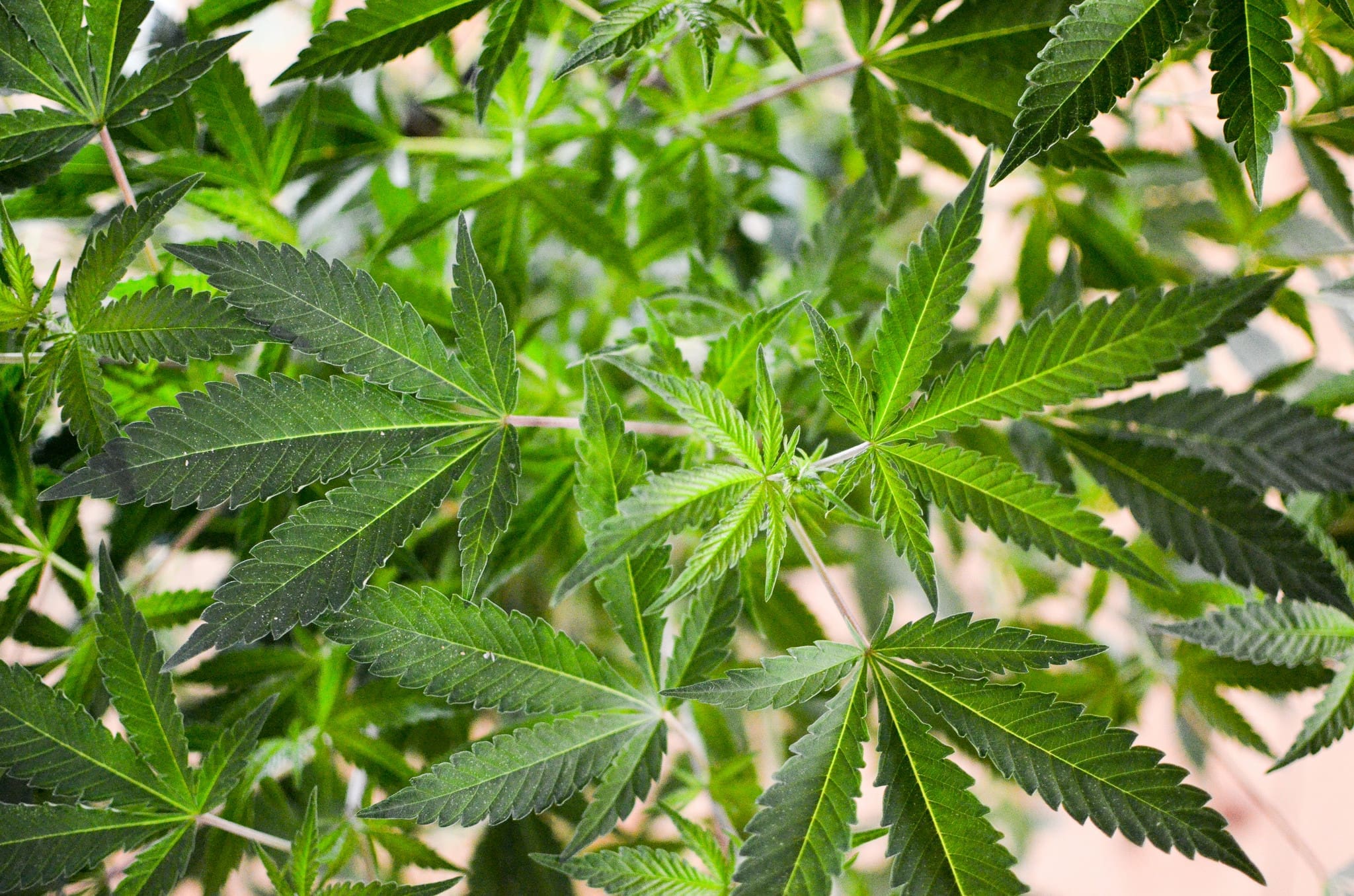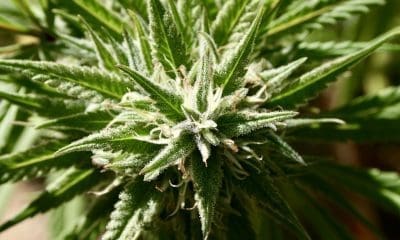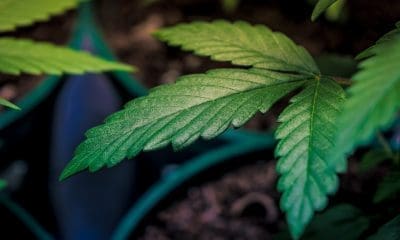Politics
Virginia Senate And House Pass Competing Marijuana Sales Bills, Ignoring Law Enforcement Opposition

Virginia’s Senate has formally signed off on a proposal to legalize retail marijuana sales in the commonwealth despite concerns raised by law enforcement groups that warn the harms from legal cannabis will outweigh those of alcohol.
The Senate on Tuesday approved a sales bill from Sen. Aaron R. Rouse (D) on a 21–18 vote, next sending the measure to the House of Delegates.
The vote came a day after the House approved a separate marijuana sales bill from Del. Paul Krizek (D) that differs from the Senate proposal in several key respects. Those differences will still need to be hammered out if lawmakers hope to send any cannabis commerce legislation to Gov. Glenn Youngkin (R) this session.
On the Senate floor, Rouse told colleagues that Virginia’s legalization of cannabis possession in 2021 and subsequent failure to adopt a framework for retail sales has led to “a major expansion of the illegal market, where unregulated, untested and untaxed products are sold, oftentimes to minors.”
“We hear from Scott County to Virginia Beach that this is a true public safety and public health crisis,” he said, “and that we’re missing out on tens of millions of dollars of potential revenue that could be reinvested in our communities.”
Rouse repeated a line that’s become common among supporters of legal sales: “This bill does not create an adult-use market,” he said, “but rather sets up a system to regulate and tax what is already here.”
Earlier this week, however, various law enforcement associations came out in opposition to legal retail sales. A letter sent Monday to General Assembly members from the Virginia Sheriff’s Association, Virginia State Police Association, Virginia Association of Chiefs of Police and Virginia Association of Campus Law Enforcement Administrators urges lawmakers to oppose “any legislation that would lead to a retail cannabis market in Virginia.”
“Cannabis is more addictive than alcohol. Thirty percent of cannabis users have cannabis use disorder compared to 11% of alcohol users. Nine percent of those who experiment with marijuana are expected to become addicted,” the police letter argues. “States with legal retail cannabis have failed to extinguish the cannabis black market while also seeing that cannabis tourism creates a nexus for the international drug trade that is dominated by organized crime, and an increase in illegal operation following legalization.”
While some supporters of regulated sales say the change could bring in as much as $50 million in state tax revenue during the first year, the law enforcement letter claims Virginia would see “no significant change in tax revenue.”
“The tax revenues raised would be miniscule [sic] compared to the additional funding required to increase behavioral-health resources and other public safety resources,” the letter says. “These statistics bear out why legalizing retail sales of cannabis is the wrong path for
Virginia.”
Use, possession and limited cultivation of cannabis by adults is already legal in Virginia, the result of a Democrat-led proposal approved by lawmakers in 2021. But Republicans, after winning control of the House and governor’s office later that year, subsequently blocked the required reenactment of a regulatory framework for retail sales. Since then, illicit stores have sprung up to meet consumer demand.
Reform supporters have been hopeful that regulatory legislation can pass now that Democrats regained control of both chambers of the legislature in last year’s elections.
“This bill will accomplish what the legislature set out to do back in 2021,” Rouse said.
Both legal sales bills—SB 448 and HB 698—would launch legal, regulated marijuana sales beginning next year, though significant differences remain in terms of timing, licensing, taxes, social equity, criminal penalties and whether cultivators would be able to grow cannabis outdoors.
As passed by the House, HB 698 would allow existing medical marijuana operators, five hemp businesses and up to 60 equity-focused microbusinesses open for retail sales on January 1, 2025—earlier than stores would open under the Senate bill. Medical operators would need to pay $400,000 apiece to six microbusinesses through a proposed accelerator program in order to qualify for the early opening.
Cannabis products would be taxed at 9 percent under the House proposal, and outdoor cultivation would be banned completely.
The Senate bill, meanwhile, would not give any group of license applicants a head start on adult-use sales. Retailers would open later in 2025 after a general application and licensing process.
“In this bill, no one applicant is preferred over another,” Rouse said on the Senate floor. “There are no head starts.”
Products would incur a maximum tax rate of about twice that of the House measure, or 17.5 percent, which would consist of a 12.5 percent state excise tax, up to a 3.5 percent local tax that municipalities could impose and the 1.125 percent portion of Virginia’s sales tax that funds K–12 education.
Outdoor cultivation would be allowed for smaller licensed growers under the Senate proposal, though larger cultivators would be required to grow inside.
The differences have divided some advocates, though supporters say they’re still hopeful about reaching consensus as the lawmaking session continues.
“There’s a strong coalition among stakeholders forming as long as everyone gets some of what they need in the final vehicle,” Jason Blanchette, president of the Virginia Cannabis Association, told Marijuana Moment after Tuesday’s Senate floor vote. “This week will be critical.”
Krizek, the sponsor of the House bill, closed his comments ahead of second reading passage on the floor last week with a conciliatory message to Senate lawmakers “who share my belief that now it’s time for the state’s $3 billion illegal cannabis market to have competition from a safe, tested and taxed product.”
“I recognize there’s many aspects of this bill that you might not be comfortable with,” he said. “But I’m committed to working with you and everybody in this body to find a bipartisan bill as we continue work on this complicated topic.”
Sen. Schuyler VanValkenburg (D), who is also a teacher, said ahead of the floor vote on Tuesday that the only reason he supports the Senate legal sales bill is its public health measures and efforts to dissuade young people from using drugs. He noted that the measure sets up a public health advisory board that could veto proposed cannabis regulations that intersect with public health.
“I want a licensee to make money,” VanValkenburg said, “but I want them looking out for my community, as well.”
As for what’s next, advocates are expecting changes in each chamber as it considers they opposite body’s legal sales bill, with final details potentially being negotiated in a bicameral conference committee.
“After crossover, we can expect to see each chamber amend the other’s bill with a substitute of their own version,” JM Pedini, development director for the advocacy organization NORML and executive director of the group’s Virginia chapter, told Marijuana Moment last week. “But the real work will be done in conference committee, at which point conferees will have to decide if these are simply messaging bills, or if they intend to send Governor Youngkin bills that are palatable enough for him to even consider not vetoing.”
—
Marijuana Moment is tracking more than 1,000 cannabis, psychedelics and drug policy bills in state legislatures and Congress this year. Patreon supporters pledging at least $25/month get access to our interactive maps, charts and hearing calendar so they don’t miss any developments.
![]()
Learn more about our marijuana bill tracker and become a supporter on Patreon to get access.
—
While the governor has not explicitly said he’ll veto a retail marijuana proposal, he signaled last month that he doesn’t have “any interest” in legalizing sales under the Democrat-led plans.
When he was first elected, Youngkin said he was “not against” allowing commercial sales categorically. He expressed that there were certain Democratic “non-starters” in earlier 2021 legislation such as provisions setting labor union requirements for marijuana businesses—and he wanted to address concerns from law enforcement—but he generally indicated that there was a bill he could support.
That expectation has been tempered during the beginning of the new year, however, with some predicting the governor will veto any legal sales legislation that lawmakers send him.
A sales bill did advance through the Democratic-controlled Senate last session, but it stalled in committee in the House, which at the time had a GOP majority.
Search Interest In Delta-8 THC Nearly Twice As High In States Without Legal Marijuana, Study Finds
Photo courtesy of Philip Steffan.














